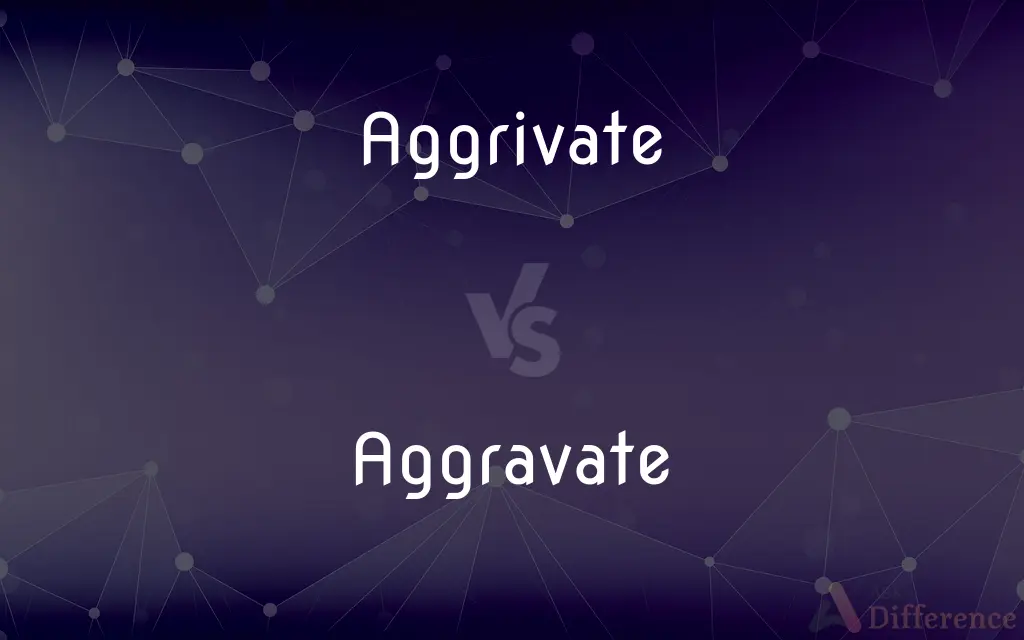Aggrivate vs. Aggravate — Which is Correct Spelling?
By Tayyaba Rehman — Updated on March 26, 2024
Aggrivate is incorrect. The right spelling is Aggravate, meaning to make a situation worse or to annoy.

Table of Contents
Which is correct: Aggrivate or Aggravate
How to spell Aggravate?

Aggrivate
Incorrect Spelling

Aggravate
Correct Spelling
ADVERTISEMENT
Key Differences
Drop the "i" from "Aggrivate" to correct it.
Recall "Grav" like "gravity," something that can weigh you down.
Remember "aggRAVate" emphasizes the "rav," not "riv."
"Aggra-vate" sounds like "aggravation." If you hear the "tion," you're on track.
Only one "i" is needed to irritate – "aggravate."
ADVERTISEMENT
How Do You Spell Aggravate Correctly?
Incorrect: Trying to fix it now might aggrivate the problem.
Correct: Trying to fix it now might aggravate the problem.
Incorrect: The way he talks can sometimes aggrivate his friends.
Correct: The way he talks can sometimes aggravate his friends.
Incorrect: It will only aggrivate the situation if you yell.
Correct: It will only aggravate the situation if you yell.
Incorrect: The noise outside started to aggrivate me.
Correct: The noise outside started to aggravate me.
Aggravate Definitions
To make a situation more severe.
The weather will aggravate the flooding situation.
To intensify an existing condition.
Lack of sleep can aggravate health issues.
To irritate or annoy.
His comments only served to aggravate her.
To make more serious or intense.
Ignoring the problem will only aggravate it.
To make worse or more troublesome
Aggravate political tensions.
Aggravate a medical condition.
To annoy or exasperate
The child's whining aggravated me.
To make (an offence) worse or more severe; to increase in offensiveness or heinousness.
(by extension) To make worse; to exacerbate.
To give extra weight or intensity to; to exaggerate, to magnify.
He aggravated the story.
(obsolete) To pile or heap (something heavy or onerous) on or upon someone.
To exasperate; to provoke or irritate.
To make heavy or heavier; to add to; to increase.
To make worse, or more severe; to render less tolerable or less excusable; to make more offensive; to enhance; to intensify.
To aggravate the horrors of the scene.
The defense made by the prisoner's counsel did rather aggravate than extenuate his crime.
To give coloring to in description; to exaggerate; as, to aggravate circumstances.
To exasperate; to provoke; to irritate.
If both were to aggravate her parents, as my brother and sister do mine.
Make worse;
This drug aggravates the pain
Exasperate or irritate
To worsen a particular circumstance.
Such a move will aggravate tensions in the area.
Aggravate Meaning in a Sentence
Constant interruptions aggravate me during work.
Pollen can aggravate allergy symptoms in spring.
Cold weather can aggravate arthritis symptoms.
Traffic jams tend to aggravate stress levels.
Loud music at night can aggravate neighbors.
Ignoring advice can aggravate the issue at hand.
Harsh skincare products can aggravate acne.
Skipping meals might aggravate your hunger later.
It's important not to aggravate an injury by moving too much.
Pollution can aggravate respiratory conditions.
Economic policies can sometimes aggravate inflation.
Bad news can aggravate worries about the future.
Stress can aggravate heart conditions.
Insufficient sleep can aggravate concentration problems.
Negative attitudes can aggravate tense situations.
Procrastination can aggravate time management issues.
Criticism can aggravate feelings of insecurity.
Heavy lifting can aggravate back pain.
Overworking can aggravate mental health issues.
Common Curiosities
Why is it called Aggravate?
It comes from the Latin "aggravatus," meaning "to make heavy."
What is the verb form of Aggravate?
Aggravate.
What is the root word of Aggravate?
The Latin root is "gravare," meaning "to make heavy."
Which vowel is used before Aggravate?
Typically "a" as in "an aggravate."
What is the pronunciation of Aggravate?
"AG-ruh-vayt."
What is the singular form of Aggravate?
Aggravate.
Which preposition is used with Aggravate?
"By" as in "aggravated by the noise."
Is Aggravate a negative or positive word?
Generally negative.
Which article is used with Aggravate?
Either "a" or "the" can be used, depending on the context.
Is Aggravate an adverb?
No, Aggravate is a verb.
Is the Aggravate term a metaphor?
No.
Is the word Aggravate imperative?
It can be used in an imperative sentence, e.g., "Don't aggravate the situation!"
Which conjunction is used with Aggravate?
Any conjunction can be used depending on the sentence structure, e.g., "and," "but," or "or."
Is Aggravate a noun or adjective?
Aggravate is a verb.
Which determiner is used with Aggravate?
It depends on the context, but as a verb, it typically won't use a determiner.
What is the plural form of Aggravate?
There isn't a plural form since it's a verb.
Is Aggravate an abstract noun?
No, Aggravate is a verb.
Is the word Aggravate a gerund?
"Aggravating" would be the gerund form.
Is the word “Aggravate” a Direct object or an Indirect object?
It can function as neither; it's a verb. But it can have both direct and indirect objects in a sentence.
What is the opposite of Aggravate?
Alleviate.
Is Aggravate a vowel or consonant?
Aggravate is a word, not a letter.
Is Aggravate a collective noun?
No.
What is a stressed syllable in Aggravate?
The first syllable, "Ag."
What part of speech is Aggravate?
Verb.
What is another term for Aggravate?
Exacerbate.
How is Aggravate used in a sentence?
The loud music served to aggravate his headache.
Is Aggravate a countable noun?
No, Aggravate is a verb.
How many syllables are in Aggravate?
Three syllables.
How do we divide Aggravate into syllables?
Ag-gra-vate.
What is the first form of Aggravate?
Aggravate.
What is the second form of Aggravate?
Aggravated.
What is the third form of Aggravate?
Aggravated.
Share Your Discovery

Previous Comparison
Comute vs. Commute
Next Comparison
Facillity vs. FacilityAuthor Spotlight
Written by
Tayyaba RehmanTayyaba Rehman is a distinguished writer, currently serving as a primary contributor to askdifference.com. As a researcher in semantics and etymology, Tayyaba's passion for the complexity of languages and their distinctions has found a perfect home on the platform. Tayyaba delves into the intricacies of language, distinguishing between commonly confused words and phrases, thereby providing clarity for readers worldwide.


































